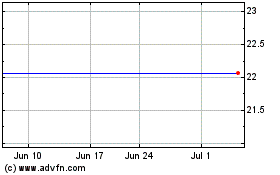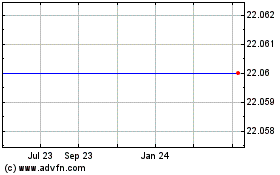Mall Landlords Dive Deeper Into Retail Assets
November 08 2016 - 5:59AM
Dow Jones News
By Esther Fung
The largest mall and strip center landlords in the U.S. are
trying to combat a wave of store closures by dipping into their own
pockets.
Some are acquiring retailers outright, while others are buying
up space from department stores and snapping up other retail
locations.
Chicago-based General Growth Properties, the second-largest
real-estate investment trust by number of properties, said it
bought five stand-alone stores from Macy's Inc. for $48 million
since the beginning of the third quarter.
"We've been pretty opportunistic here," said General Growth
Chief Executive Sandeep Mathrani, noting that his interest was
sparked by Macy's August decision to close 100 stores to focus on
digital investments. He doesn't rule out further acquisitions but
added that the firm will be careful in its selection.
General Growth also has purchased space from Sears Holdings
Corp. in the past.
Retail property landlords are battling a storm in the retail
sector sparked by consumers' changing shopping habits. To win, they
must identify which new investments could best recapture shoppers'
attention.
They also must convince investors that snapping up properties
and companies are promising growth strategies that improve their
competitiveness.
"Investors are trying to figure out how much of this is
reactionary or defensive and how much of it is to push the quality
of the portfolio. We're in the middle of the transition," said D.J.
Busch, an analyst at Green Street Advisors, a real-estate research
firm.
General Growth has replaced Macy's stores with those of Dick's
Sporting Goods, department store chain Belk Inc. and Lifetime
Fitness. The Macy's at Tysons Galleria in Virginia will continue to
operate on a short-term lease.
Landlords also are diving directly into the retailing business.
In September, General Growth and Simon Property Group joined a
consortium to acquire Aéropostale Inc., one of their tenants, which
helped the clothing retailer stave off liquidation.
General Growth and Simon contributed $20.4 million and $33
million, respectively, to the consortium. Executives brushed off
suggestions the deal was merely aimed at ensuring they retain
control over the Aéropostale stores in their portfolios.
"The only reason why we decided to make this investment is
because we believe we can make money," said David Simon, CEO of
Simon Property, during a recent earnings call. The consortium will
keep 500 stores open, more than the 240 stores initially projected,
he said. The teen apparel retailer had roughly 800 stores before
its bankruptcy filing.
"Amazon makes vertical investments, the cable industry makes
vertical investments," said Mr. Simon, referring to AT&T's
recent bid for Time Warner. "Making a vertical investment here or
there is not going to overwhelm us. But I want the latitude, and
the investment community should want it, too."
General Growth's Mr. Mathrani, for his part, described it as a
one-off deal for his company.
Likewise, Acadia Realty Trust CEO Kenneth Bernstein recently
told analysts he is looking to acquire assets that "may not be
consistent with public markets but that work just fine in our
fund."
The latest deals are small compared with the widespread culling
of slumping shopping centers that landlords have been undertaking
in recent years. Sales growth among tenants has been tepid, and
landlords' re-leasing spreads, or the change in rent a square foot
between expiring and new leases, have narrowed in the recent
quarters.
Investors' frustration is sparking questions about further share
buybacks and the wisdom of expansion in an uncertain retail
environment. Luxury mall owner Taubman Centers Inc. is fending off
an activist investor push to stop expanding and consider a sale of
its assets as its stock price lags behind the net asset value of
the malls it owns.
"We're the largest shareholder in the company, we eat our own
cooking," said Robert Taubman, CEO during Taubman Centers' recent
earnings call. "Over time, NAV [net asset value] will close. It has
in the past, it will, in our view, in the future."
Taubman recently traded at about $70 a share, compared with NAV
estimates of about $99 per share.
Write to Esther Fung at esther.fung@wsj.com
(END) Dow Jones Newswires
November 08, 2016 05:44 ET (10:44 GMT)
Copyright (c) 2016 Dow Jones & Company, Inc.
GGP Inc. (NYSE:GGP)
Historical Stock Chart
From Mar 2024 to Apr 2024

GGP Inc. (NYSE:GGP)
Historical Stock Chart
From Apr 2023 to Apr 2024
